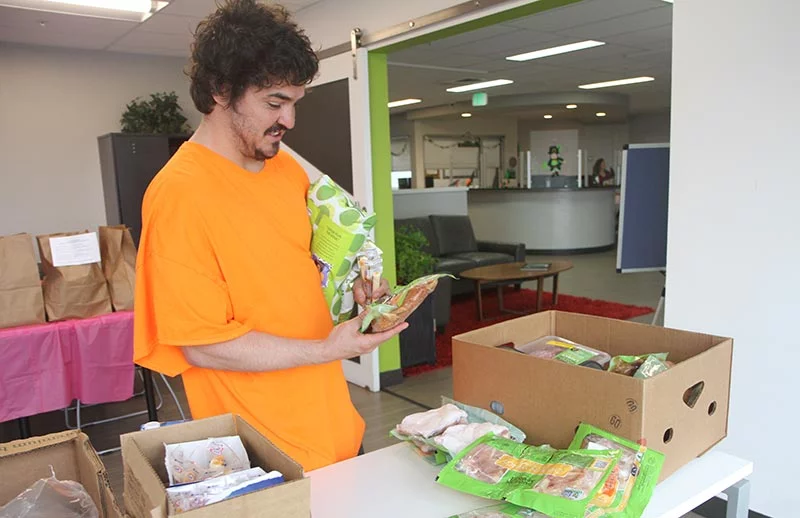
Bobby Biss was in a much different place a year ago.
“This time last year, I had frostbite on 10 toes and lost a sliver of my big toe,” he said.
Looking through the glass doors of his housing community, Biss pointed toward railroad tracks that run through the center of Fort Collins, Colorado. In his other arm, he hugged a bag of mostly fresh produce.
“I was living under a bridge just over there,” he said.
For all but five months of the past 7 years, Biss has been experiencing homelessness. In the fall of 2022, good fortune smiled upon him, and he moved into an apartment at Redtail Ponds, one of two communities in Housing Catalyst’s Permanent Supportive Housing program. The team there, including Resident Service Specialist Raychl Reger, helped Biss get his birth certificate and then an ID card, which enabled him to apply for disability and other benefits.
Permanent Supportive Housing is an innovative program that combines affordable housing with supportive services to address the needs of people experiencing chronic homelessness. In northern Colorado, the number of people experiencing unsheltered homelessness increased by 44.4% between 2020 and 2022, according to the organization.
Within Housing Catalyst’s two facilities (the other is Mason Place), nearly 86% of residents in 120 apartments report two or more disabilities and 62% report a chronic health condition.
“Most of the residents experience layers of disabilities, which creates complicated challenges and makes the transition into housing difficult,” said Daniel Covey, a manager in Housing Catalyst’s Permanent Supportive Housing Program. “We see that once people get housed, they often have trouble getting out and about, so having services provided on-site is incredibly valuable.”

Housing Catalyst’s Permanent Supportive Housing team offers in-house services as much as possible. Still, their small staff often looks for additional ways to help residents, including opportunities to address health care and nutrition needs. In the past, they’ve had success creating partnerships with organizations for one-time opportunities, but to address continuing needs, they needed a partner that would provide long-term, continued support.
UCHealth’s Deanna O’Connell, a community health educator for UCHealth Community Health Improvement (CHI) in northern Colorado, learned of the organization’s service gap and knew CHI could help.
UCHealth’s multi-skilled community health teams have been improving the lives of northern Colorado residents for more than 30 years. These teams support people of all ages and populations through programs like Healthy Hearts and Minds (now including the Healthy Kids Club), which is in 120 schools and aims to encourage students to embrace healthy habits. Community Health Improvement also delivers family education opportunities and oversees the Aspen Club, which offers health resources such as medication reviews and fall prevention classes to people who are age 50 and older.
CHI also has a chronic disease management program that provides supplemental support to the UCHealth Family Medicine Center Food Pantry in Fort Collins.
O’Connell and colleagues Ellen Pihlstrom and Julie Knighton make up the chronic disease self-management team. They began working with Housing Catalyst in September 2022 by initially providing access to nutritious food.
Each week, residents sign up for a grocery bag filled with items they requested from the Family Medicine Center Food Pantry. Along with the bags, the team of three collects and delivers hundreds of pounds of fresh produce for the residents each week through a partnership with the Food Bank of Larimer County.
For two hours each week, CHI health educators make healthy food available for residents at Redtail Ponds. Biss, who was perusing the produce table with his newly adopted service dog, Summer, said he loves being able to stock his refrigerator with fresh veggies.
As of March 9, 2023, CHI has delivered 7,120 pounds of food to Redtail Ponds residents — the equivalent of 5,934 meals.

During the two hours each week, UCHealth employees have built meaningful relationships with Redtail Ponds residents and helped to identify other health gaps, such as pain management and care coordination.
CHI has held nutrition and mindfulness classes and added acupuncturist Bruce Hinckley from CHI, who now spends one hour a week caring for residents at Redtail Ponds. In addition, the team provides weekly blood pressure checks and education, and other supportive resources to help residents manage chronic illnesses based on a resident’s needs.
CHI’s Medicare Accountable Care Collaborative (MACC), which focuses on care coordination, case management and supportive services for Medicaid patients and families, also meets with Redtail Ponds residents to help them navigate the complexities of multiple agency and provider services required to support their health and social needs.
“It’s wrapping all those services around them along with the MACC team helping residents navigate regular access to health care, saving millions in ER visits,” O’Connell said. “But for us, it is a way to decrease disparities and address social determinants of health barriers such as transportation and food insecurity. It is a joy to see the residents being supported and getting good food.”
The partnership will expand to the Mason Place community soon.
“Life can get tough. If we can lend a hand, so it is not such an uphill climb, then we are doing our job,” O’Connell said.
